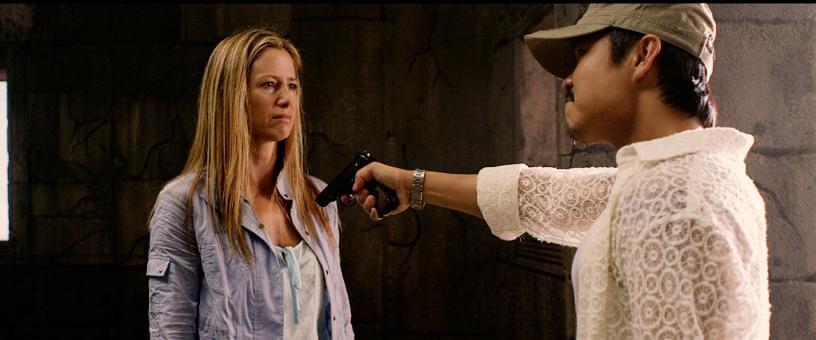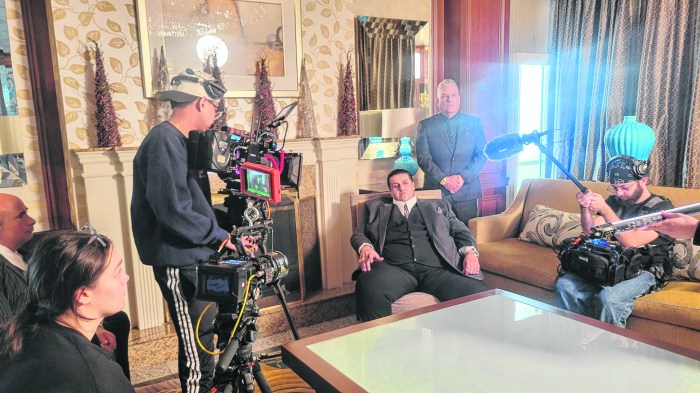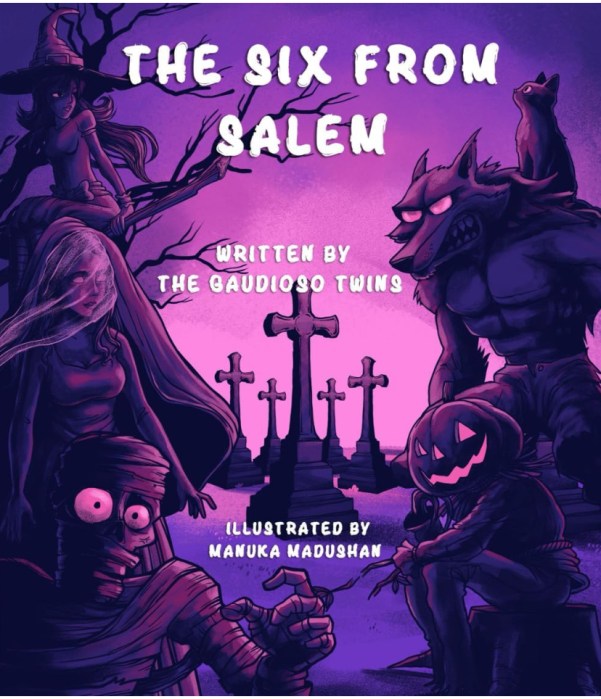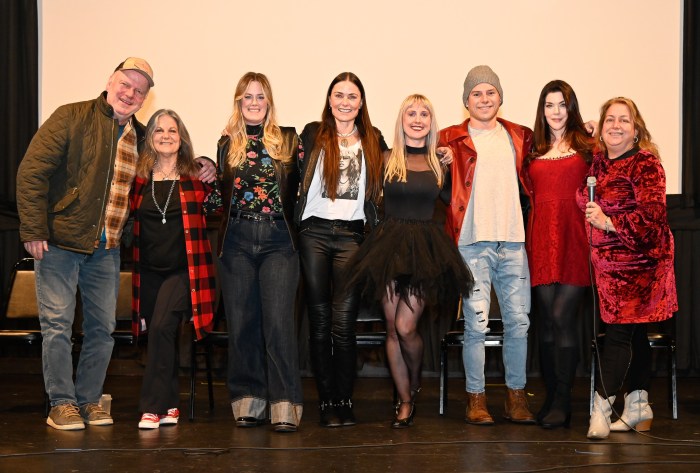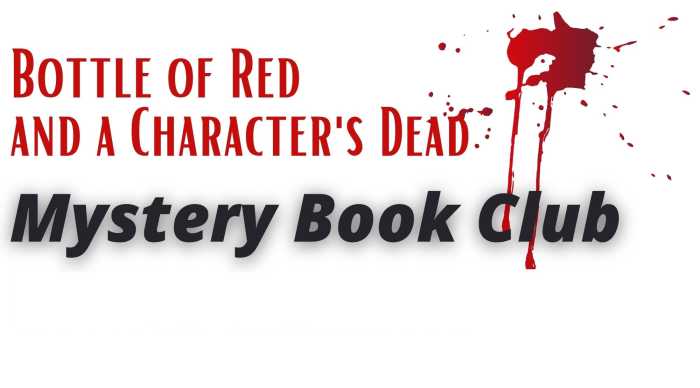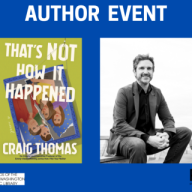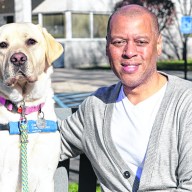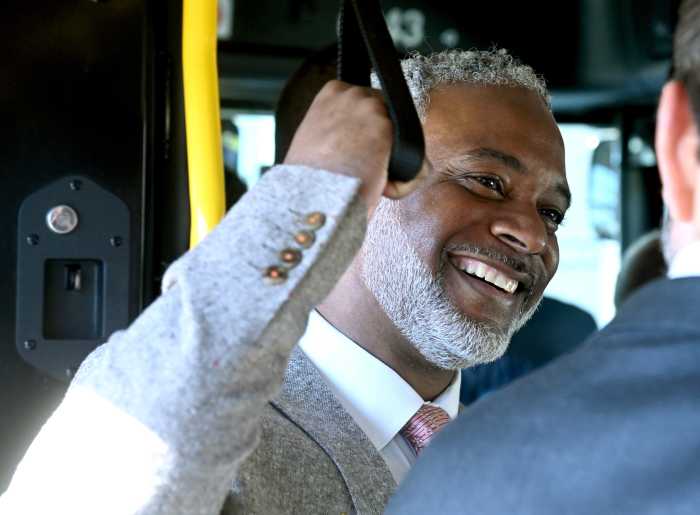 For statuesque screen star Mira Sorvino, life can come pretty close to imitating art, when not the other way around. Which explains a lot about her current turn as a distraught mom fighting the global sex trafficking of children in Christopher Bessette’s Trade Of Innocents, a cause which arouses her passion and activism in the real world as well.
For statuesque screen star Mira Sorvino, life can come pretty close to imitating art, when not the other way around. Which explains a lot about her current turn as a distraught mom fighting the global sex trafficking of children in Christopher Bessette’s Trade Of Innocents, a cause which arouses her passion and activism in the real world as well.
Though Mira did have a bit of contradictory explaining to do during this phone conversation, as to why on the other hand, she grabbed at the chance to play a hooker herself in Woody Allen’s Mighty Aphrodite. And a comical outlook on the matter, that happened to land her an Oscar for Best Supporting Actress in 1995 as well.
Mira also took time out during this gab session, to decipher Marilyn Monroe when once playing her, and while wearing the legendary seductive screen siren’s actual cherry covered silk dress. Along with memories of costarring with Marlon Brando in a movie, and the strange thrill for her of being sized up by the iconic hunk as, well, a tall drink of water.
How did you get involved in a movie about the global sex trade in children, and why was it important to you to become involved?
MIRA SORVINO: When I read the script and realized it was about the child sex trade – and this takes place in Cambodia, but it involves practically every country in the world – I was really moved by the story. And I thought it was a chance to show a different side of the problem.
But it was because of my passion for the topic. You know, I’m the UN Goodwill Ambassador for human trafficking since 2009. And I spend a lot of time talking to victims of human trafficking around the world.
And the child victims I’ve met, they are the most heartbreaking little people you will ever want to meet. And amazing, and brave.
I mean, the survivors are incredible. They way that they rebound, and the way they have courage and hope.
But just knowing their plight, and what is done to them and what they go through, I thought it was really important to be part of this production. Highlighting their plight, and highlighting responses to it.
What’s up with your character Claire in the movie?
MS: I’m sort of the civilian in the movie. I come into it grieving the death of my daughter, who had been killed by a pedophile in the States.
And I’m roaming the world in a way. And I kind of find my footing by volunteering at an organization that helps with the aftercare of rescued survivors.
You know, it’s been remarked that no other film shows the aftercare side of the equation. And the work that’s with the survivors, the rescue victims.
And how important, how vital that side is. Because without them, the people who have been through the trauma of human trafficking, have little shot at a normal life.
But with this, they bloom miraculously. And often they end up being re-trafficked, if they don’t get that kind of help.
Now Mira, you’re a passionate advocate against this type of prostitution, yet you played a prostitute in Woody Allen’s Mighty Aphrodite. And you won an Best Supporting Actress Oscar for that as well, in 1995.
MS: Yeah, life is funny that way, isn’t it!
Well, talk about portraying a prostitute in a comedy, and do you look back on that decision differently now, given your current concerns?
MS: Um, first of all, it was a comedy. And almost a fantasy. It doesn’t really have any bearing on real life.
More of her life was about being a porn actress, than a prostitute. And she was very excited about her porn career.
But it’s a silly idea. Although I think, a wonderful movie. But I think I would look at it differently, if I were offered it now.
How so?
MS: Because I understand how people originally start in prostitution. Because many adult prostitutes were trafficked as young people.
And then they have no options when they grow up, and continue in the same trade. But none of us knew about trafficking then, really.
You know, it didn’t become really well known as a phenomenon until a little over ten years ago. And I only discovered it in 2004. So!
And what was it like being directed by Woody Allen?
MS: Oh, it was wonderful. He’s a fantastic director. What a genius, really amazing. it was great.
And you also played Marilyn Monroe in the TV movie Norma Jean And Marilyn. And I hear that you went through quite an emotional experience and feeling, how dare I play her, when putting on the actual dress she wore in The Misfits. Talk about that.
MS: Yeah, I had actually found that dress in a NY costume house. They had the actual dress that she wore in The Misfits, the silk dress with the red cherries on it.
So I brought it to the production’s attention, and they rented it. And then when I put it on I was like, oh how can I do this!
You know, nobody can be Marilyn Monroe. She is so amazing, that nobody could. Least of all me! How can I come even close.
And then I realized, okay wait. This is just my homage to her. I can’t be her, so I’m not even gonna try and be her.
You know, I’m gonna try and express something that I think I know about her, and make it my tribute to her. And that’s what I’m gonna do.
So that took the curse off of it! And helped me get through the feeling of, like how dare I even try, you know? So…
I hear you. And you also said that there was something symbolically tragic and very American culturally about her life, regarding the illusory nature of fame. What about that?
MS: Yeah. Well I mean, she’s the poster child for the American dream of making it, going to Hollywood and becoming a movie star.
But then it all kind of came crashing down around her, as she approached middle age. And I think the biggest tragedy in her life, was that she didn’t love anyone in a caretaking capacity.
Because if she had just one person that had relied upon her that she took care of, I think her whole story would have been different. And she was in a position all the time to be asking for love.
Because she was trying to repair the wounds of her childhood. Which was fraught with abuse and neglect. You know, her mother put her in an orphanage several times.
Her mother was schizophrenic, and she was sexually abused as a kid. So she didn’t have much of a chance. And the fact that she went as far as she did, is really extraordinary.
But I think there was a giant hole, which she was always trying to fill. With the adulation of her fans, and with various men that she would choose.
And they all ended up kind of not being right. Not being kind enough, or loving enough. And she didn’t have anyone else that she took care of.
And I think if she had a child – and I know she wanted to have a child, although she also had numerous abortions. So it’s kind of a conundrum there.
So I think if she had taken care of someone else, it might have given her a different strength. And started her life anew.
And it wouldn’t all have been about trying to fix her own sadness. But instead to make someone else happy.
Speaking of child sexual abuse, why did you first become passionate in a big way about sex trafficking and sex tourism, that led you to sign up for Trade Of Innocents?
MS: I became concerned with the whole notion of human trafficking, which is really modern day slavery. So it’s really slavery with a new face. And that slavery hadn’t gone away, it has just gone underground.
And especially upon meeting some of those children, the first child victim that I met was in Mexico City during a global campaign I went on. And we went to a shelter for girls who had been rescued from the sex trade.
And they were really small children there. And I got to talk to one of them, she was seven. She had been in a brothel in Cancun, serving tourists.
And to know that her own relatives put her in there, it was quite shocking. And even more shocking to think that probably college kids on spring break were using her.
And she couldn’t even describe them. When she was asked what she had been made to do, she just said that the things she was asked to do were ‘incorrectos.’ You know, wrong.
And she was so little, and so sweet and cute. You know, her baby teeth had dropped out and she didn’t even have her front teeth yet.
And just the idea of that she could have been used and manipulated in the most horrendous way by adults, it just made me furious. And sick. I couldn’t sleep for two weeks after that trip.
And since then, I’ve become quite involved in the issue in the US. Because we have up to 300,000 kids at any given time, being sold on the street of the US.
And then there’s everything else that entails. Beatings, possible death. HIV, drug addiction, rape and unwanted pregnancies. You name it. That life is full of it.
Along with your Marilyn Monroe biopic, you were also in a film for real with another icon, you costarred with Marlon Brando in Free Money. What are you memories of Brando?
MS: That was quite a trip. That job for me was basically, I got to work with Marlon Brando! I got to kick it with him in some scenes.
And the day he walked in – he walked in two and a half days late, by the way! He was there, but he just didn’t come to set.
And everybody was just waiting for him. And there were rumors about him being sick, but I don’t think he was sick.
But he walked in halfway through the day. And there was me and Charlie Sheen, and Thomas Hayden Church and Donald Sutherland.
So we were all waiting for him. And he walked in, and we all jumped up, we were so excited. And he walked in, and I was wearing heels. So he said, my you’re a tall drink of water!
And I almost died. I was like oh, Mr. Brando! And then he sat us down afterwards, and was talking with us.
He was telling us about how, during his early days of acting, how he used to put himself through all of these contortions.
You know, to get to the emotional results that were necessary for the screen. And he said, acting is a terrible profession.
What did Brando mean?
MS: Like you have to go and act like your dog died. And put yourself through all these terrible contortions.
But then I realized one day, he said, that the audience doesn’t care how they get there. As long as you get them there.
So then he said he started using all these tricks. Like writing lines around the room, on different surfaces. And then he would look at them as he spoke.
And how he would also tape the lines on a piece of paper, on his co-star’s forehead. And I was like, you couldn’t do that with me!
But I said that only because I wanted to make sure that wasn’t going to happen! Because he was a game player too. And a master manipulator.
You know, he liked dominating people. But he walked away after this discussion. And Donald Sutherland said, wow. That’s like God saying there’s no heaven!
Because you know, people consider him to be the greatest actor of the 20th century. And for him to say that he started faking it halfway through his career…
But I found that was not even a hundred percent true. Because in some scenes yes, he kicked out the other actors.
And he had his assistant read him all of his lines in a earwig in his ear, from the other room. But we did a scene where he took out his earwig, and just improved with me for twelve minutes.
And then the assistant said wow, I haven’t seen him like that since 1969! And I was like, oh great.
So he had the fire sometimes. And sometimes he was phoning it in, literally phoning it in.
So it was a very interesting situation. And he was a very interesting, fascinating personal experience. And I was thrilled. And horrified! And delighted to have had it happen.
Wow. Are there characters you would refuse to play in a movie?
MS: I have a really hard time playing characters that I don’t like. You know, if I can’t connect to the character, and find something likeable about them. For me.
And I try not to do things that are too exploitative. Or morally repugnant. You know, I have kids now!
So I always think about what they would think eventually. When they see their mom in something.
Any final word on why people should see, or rather why people must see Trade Of Innocents?
MS: Because it is hopeful. It’s not devastating, it doesn’t, you know, destroy you.
But it’s also about an incredibly important topic. And that most people don’t think about much.
And it goes on in every city in America. And it’s something we can do something about.
So see it if you want to see a great film. And if you want to be moved, and feel a call to action, you should definitely see it.




